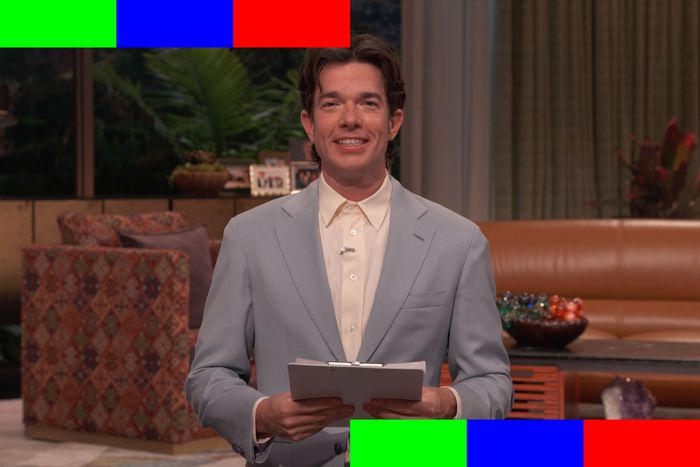
Remember how years ago, Netflix desperately tried to make “streaming talk show” a thing? Circa 2016–18, Chelsea Handler, Joel McHale, Hasan Minhaj, Michelle Wolf, even frickin’ Norm Macdonald (RIP) all got the chance to bring one of TV’s longest-running formats to digital, and all quickly saw their efforts abruptly cut short. For years, it seemed the streamer had given up on the idea of finding its own spin on talk/variety.
Then last Friday, with only modest amounts of advance hype, Netflix debuted Everybody’s in L.A., starring John Mulaney and Richard Kind and originating live from a studio in Los Angeles. As of this writing, only four episodes have aired, but I am prepared to make the following overconfident declaration: Netflix has finally cracked the talk-show code.
Going into the show’s May 3 premiere, I was expecting Mulaney’s riff on his old home of SNL: lots of sketches, some stand-up, musical guests, and maybe some quick interviews with celebs to attract an audience. What I got was a glorious mix of mid-1990s Conan O’Brien silliness, the easy celebrity banter of a stacked Johnny Carson couch during the 1970s (when his show ran for 90 minutes every night) and the “line two, you’re on the air” randomness that made Tom Snyder and Larry King radio legends. In other words, it’s an absolute mess of formats that on paper should’ve crashed and burned by the end of the first hour. Instead, Everybody’s in L.A. has gotten progressively more interesting, engaging, funny, and (pardon the word choice here, Mr. Mulaney) downright addictive with each and every episode. I need this show to be a regular part of my life.
The sad part is that, at least officially — and by Mulaney’s own declaration on night one — this show halts production forever after Friday night’s episode. It’s a six-episode limited series pegged to the ongoing Netflix Is a Joke Comedy Fest taking place in Los Angeles right now. I might want this to be a weeklong pilot for a Mulaney talk show, but according to the man himself, it is not that at all. Like the late, lamented John Mulaney & the Sack Lunch Bunch of 2019, this apparently is Mulaney scratching a comedic itch, crossing another project off the list of Things You Can Do When You’re John Mulaney and Netflix Wants to Keep You Happy.
But what if it weren’t just that? What if this were actually Mulaney low-key testing out what his life would be like as a talk-show host? Or Netflix trying to see if, given a live format and one of the biggest names in comedy as host, and its own maturation as a platform, a format that flopped six years ago — talk — now actually can draw enough viewers to justify its expense? Episode one of Everybody’s didn’t crack the streamer’s global top ten last week, while its other live events last weekend did. On the other hand, the show has popped up regularly in the streamer’s on-platform U.S. top ten most nights this week. That doesn’t feel like a sign the show is bombing with American audiences.
Here’s the thing, though. Netflix and Mulaney don’t need to just keep doing Everybody’s in L.A. as it exists today (though I’d be happy if they did). I think the creative success of this show serves mainly as proof of concept: Now that Netflix has the ability to do live television, the most important element of a TV talk show — that it feels relevant and now — can finally be present on a Netflix gabber. A future effort from Mulaney could be adjusted to air just once or twice a week, rather than every night. (The man does have a pretty thriving career as a stand-up, after all.) The weirdness could be dialed down just a bit to bring in a broader audience and make the show feel more about pop culture and world events vs. a Los Angeles travelogue. Or maybe Mulaney could do this format four times a year, pulling a 2024 Conan and traveling to a different city each quarter: I’d sure watch Everybody’s in New Orleans.
I don’t pretend to know the exact formula that would work for Mulaney and Netflix. But I am certain that Mulaney is onto something here — and Netflix should be talking to him right now about how to keep it going. After all, traditional talk shows on broadcast TV have become a little less relevant every year, and it’s hardly a given that the financially struggling networks are going to keep supporting big stars like Fallon, Kimmel, and Colbert for much longer. Netflix, having failed at its first attempts to break into late night, now has a chance to reinvent the genre in its image. And while I definitely hope the future of late night is not just more middle-age white guys like Mulaney, his show proves the streamer can — and should — make talk shows work.

